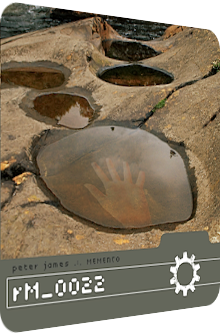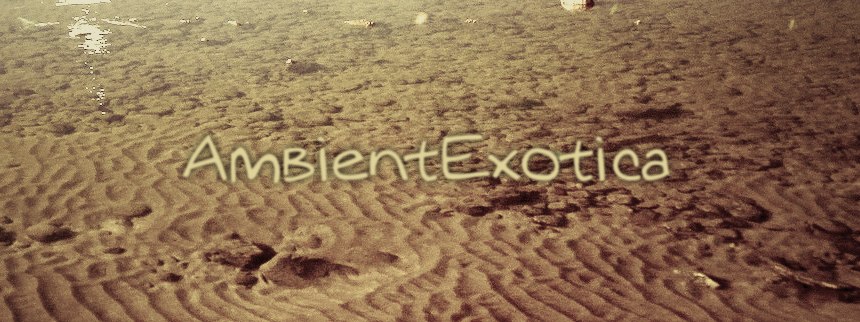
Peter James
Memento
2011
As John Koch-Northrup, runner of the Relaxed Machinery label and Ambient musician himself, told me in a recent email, he got hold of a talented composer he has known for years: one Peter James. However, he remained under the radar, largely writing music for himself and creating other non-music related things. But 2011 finally saw the return of James with his four-track album Memento, released in December of that year on Relaxed Machinery. Having always wanted to create an album that does not just feature field recordings, but puts them into the limelight and makes them the superior, driving nucleus of the work, Memento is this very project that became reality. Depicting four memories of experiences and presumably lucky incidents that took place between September 2009 and August 2010, Memento isn't the heavily contemplative critter it might imply due to its title, but allows a joyful, at times even care-free view into natural landscapes. Various chimes and synths create a dronescape which is in close adjacency to the chirping birds and gentle breezes, but all electronic elements are indeed used as underlining accents and don't put themselves into the forefront. Such being the case, Peter James has created a remarkable field recording album for two reasons that depend on each other: it is eminently humble and is hence special due to the loudness of and the focus on the life-like recordings. I was given the download version of James’ debut on Relaxed Machinery and am more than glad about having been granted the opportunity to review it. While it may seem counterproductive to dissect an album that is keen on the depiction of an enthralling flow, let me assure you that I am aware of this self-imposed clash with Memento's mode of existence; hopefully, I can nonetheless provide a deeper and most humble look at it below.
"Just go with the flow of things" is Peter James' premise as stated in the liner notes, and it is already perfectly carved out from the get-go on the opener of more than eight minutes, Sometimes We Forget, as monotonous-ecclesial sun-soaked organ streams are placed in front of a lofty field recording comprising of vividly chirping birds and the occasional coruscating bell sound whose short sustain is swallowed by the floating organ creek. Additional scintillating wind chimes of various kinds as well as the omnipresent spluttering and the fragile crackles of a supposed bonfire altogether add to the atmosphere that James wants to achieve: creating the visceral flow of tranquility and conviviality. The monotony of the organ, which only quavers and trembles due to its microscopic half-tones, is juxtaposed to the supposed monotony of the field recording; it's just birds chirping, but as every adventurous traveler knows, nature is not based on monotony rather than contingency – or providence, as the organ might imply. However, in a music-related context, the field recording does add the kind of mesmerizing coherence that works marvelous in tandem with the organs and chimes. It is no intimidating organ, but an incredibly warm one, and the potentially gelid ingredients add in fact plasticity to the mix, both reflecting and transfiguring the sun beams into aural luminosity. It is a wonderful opener, but admittedly all too consistent for many listeners, as it is indeed the case that not much is going on, and the track doesn't progress in any way, since it serves as a memorial postcard for Peter James. In the same way that a picture doesn't change its characteristic traits and depicted vistas, Sometimes We Forget is a deliberate constant, inheriting the auspicious flow of things.
The following twelve-and-a-half minutes of Everything Matters are even more intriguing, as James uses a trick that I didn't encounter for a long time in Ambient music: like the field recording artists à la Chris Watson and Francisco López, James revs up the volume of the field recording, thereby causing a mellifluously vivacious, life-like panorama full of happily chirping birds, New Age-evoking wind chimes and the slow introduction of a prolonged celestial synth sweep that is actually much colder than the organ of the opening track, but only for the first few minutes, as it hasn't reached its full force yet. Complemental cherubic textures begin to waft around its nucleus, resulting in a cozily fuzzy synthscape that is perfectly embedded behind the frolicking birds. It is yet again a monotonous synth, but its monotonicity is camouflaged by the many oscillating sub-textures that gleam and sparkle. The final three and a half minutes present a proper field recording that isn't perturbed by any filters. A gently gurgling river, creaking wood and a short, only second-long reoccurrence of the wind chimes recall reminiscences of a beautiful Summer day.
Moments Within Each Moment is the most mysterious track of Memento, and while it actually starts with the glitzy luminescence of a chime, floating water streams are soon flowing in. But the soundscape is not just aquatic, for James harks back on the organ of the opener Sometimes We Forget and bolsters a similar synth with accentuating Drone elements such as an interwoven deep bass line. The mystique of the composition derives from the temple bells that are placed next to the water stream. However, the mysterious aura is soon boosted to an arcane enigma, as the backing synth is stripped off its textures for a longer timespan, and once this happens, the track sounds slightly creepy and definitely cold. Even when the temple gongs return, they reside on a spectral tonality, their tone sequences nurturing the dense, presumably foggy and blue-tinted atmosphere. It is only after over 15 minutes that keys in major return, injecting mellowness and silk to the arrangement; still, Sometimes We Forget remains in darker waters. It is not as cavernous as Vir Unis' Everything Seeks Balance, but the stylistic similarities are noticeable. It is an omission which drives this composition: there are no birds on here! If you listen closely, you may encounter bird-like noises towering above the floating water streams, but you can never be too sure. The blithesome atmosphere has vanished, but the presented kind of mystique contains an abyssal depth and is still utterly entrancing due to the water elements and the muffled temple gongs. I can see New Age listeners drooling all over this song, but rest assured that it's also tasteful for Drone fans and field recording afficionados.
The final arrangement of 23 minutes is called Nothing Matters, a restructured reminder of the second track Everything Matters. As it is always the case with such claims of absoluteness, you can either read this exclamation in the nihilistic or good-natured sense, for if nothing matters, you might as well enjoy it. And this ultimate offering is a real field recording gem, as it provides an almost synth-free, unaltered gaze onto a beach scenery with smooth ocean waves and a permanent stream of gurgling water, making me wonder whether two field recordings are overlaid on top of each other, for you seldom find rivers next to a beach. There are once again deep temple gongs interspersed and a few allotted wind chimes here and there, but they don't distract from the natural incidents and are only played during the first six minutes or so. Afterwards, the track turns into an innocent moment of deep relaxation. The wave-like, well, ocean waves are very interesting themselves, for it is the phase of their downfall where all the natural ornaments can be heard: whisper-quiet surfs and bubbling droplets entertain in-between each shore-reaching wave. And that's the essence of Nothing Matters. While Watson and López usually set up time-lapsing, so-called progressive recordings that tell a story or boost the speed of an incident in one way or the other, Peter James presents one particularly arbitrary moment and finishes the recording in another accidental moment, as nothing matters anyway. Depending on your viewpoint, you are either bewildered by that thought or all the happier afterwards.
Memento is a strongly enthralling and mesmerizing album, and I have to stress once more that it is actually quite an audacity to write about it in such great detail, as the most humble approach of Peter James is self-explanatory: he delivers four vignettes of instances he experienced during the 2009 and 2010, and these are now presented on this work. His particular style, patience and humbleness are still worth noting, as all three equipollent characteristic traits flow into this album. While the title Memento usually insinuates a heavy burden – even without the added mori at its end – or a deep process of thinking and pondering, it is only the third track Moments Within Each Moment that fathoms the concept of the riddle of life, while the remaining three offerings are positively lightweight in that they are sunny, blithesome and magnanimously illuminated. If you are a fan of field recordings, this album is a no-brainer, and even the added synth elements are always inferior to nature's majesty, a trick that James only uses on this very album, as all subsequent works differ from Memento. There are no song structures to be found, and the tone sequences are purposefully rudimentary, as it is the melodies of the chirping birds and the ebullient gallons water which are all the more important. Remember.
Ambient Review 128: Peter James – Memento (2011). Originally published on Sep. 26, 2012 at AmbientExotica.com.
